- Home
- Garnett Elliott
The Girls of Bunker Pines (The Drifter Detective Book 3)
The Girls of Bunker Pines (The Drifter Detective Book 3) Read online
Copyright © 2013 by BEAT to a PULP
All Rights Reserved. No part of this book may be reproduced in any form or by any means without the prior written consent of the publisher, except where permitted by law.
The story herein is a work of fiction. All of the characters, places, and events portrayed in this book are either products of the author's imagination or are used fictitiously.
Based on characters created by David Cranmer.
Cover images from Dreamstime. Title page image from Shutterstock. Cover design by dMix.
PO Box 173
Freeville, New York 13068
USA
Praise for "The Drifter Detective" series …
It's a great set-up for a hardboiled private eye series, and Elliott provides the twisty plot … the beautiful babes, and the gritty action that the genre demands.
—James Reasoner
Spur Award nominee and author of Texas Wind
*
"The Drifter Detective" is a wonderfully evocative piece of hard-boiled pulp.
—Andrew Nette
Author of Ghost Money
*
Southern noir done proper.
—Alec Cizak
Editor and publisher of Pulp Modern
*
CONTENTS
The Girls of Bunker Pines
About the Author
More from the series
Also by Garnett Elliott
Other titles from BTAP
Connect with BEAT to a PULP
The Girls of Bunker Pines
Pursued by smoking bursts of flak, the B-17 bomber wing roared upward toward cloud level. Somewhere below, the ball bearing works of Schweinfurt lay in a blasted ruin, victim to the lethal cargo the planes had clutched in their bellies all the way from Britain. The knowledge gave Sergeant Jack Laramie grim satisfaction as he clutched the twin triggers of his .50 caliber, eyes raking the freezing blue void just outside his waist-gunner's station, alert for the telltale glare of sunlight on a fighter's cockpit. Directly behind him, he could hear his fellow gunner Ortiz softly cursing, telling the Messerschmitts to hurry up and show.
"Ten thousand feet," echoed the captain's voice from the cockpit. "Masks."
Jack strapped the rubber hose across his face as a flak explosion shook the whole plane. An open airframe did more than let cold air in—it let oxygen out. He checked the battery-leads that heated his bulky suit.
"The number four engine was hit, that last run," Ortiz called to him.
Jack nodded. A glance showed the black smoke pouring from number four's casing had stopped, but not because the engine had miraculously fixed itself. Its propeller still spun, "feathered" by airspeed after the pilot had cut off its fuel. A smoking engine was a signal to enemy fighters of vulnerability. They'd come swarming the wounded craft, looking for an easy kill. Jack hoped the reduction in speed wouldn't cause them to lag behind the formation.
"Six o'clock!" Ortiz bellowed. "Six o'clock!"
Jack's attention snapped back to his gun sights. He couldn't see the approaching Messerschmitts from his position, but he could hear the drone of their twin Daimler-Benz engines, buzzing like angry hornets. The German aces would be hot for vengeance.
Ortiz's .50 opened up with staccato notes. There. Jack saw a lone fighter come streaking in from his right. He clamped the triggers; at close to three hundred miles per hour, every tenth round a tracer, his fire came out like a bright, curving rope. It failed to touch the Messerschmitt's sleek form, which banked left in a sudden evasive. Forgot to lead 'em. Just like a rookie, goddamn it!
Now a new sound. A horrible, heavy percussion: the pom-pom-pom of German 20mm cannons.
"He's coming over to your side, Jack! He's—"
Ortiz's voice broke off in a scream. Jack tore his attention from his gun, just in time to see a stream of fat shells come marching up through the B-17's floor. Time slowed to a viscous crawl. The over-powered rounds chewed through aircraft aluminum like tissue paper, stitching their way up the fuselage, narrowly missing both Jack and Ortiz as they continued on toward the cockpit. Hydraulic fluid burst from severed lines. The plane shuddered, lurched, and Jack knew without knowing that both their belly and turret-gunners had just bought the farm.
He turned back to his gun, time still moving molasses-slow. The number four engine was the least of their worries now. He wanted, desperately, another crack at those Luftwaffe pilots who were playing hell with his crew. Just let the bastards try coming in on his side. But as he readied the .50 for another go, a gloved hand came down on his shoulder.
"What the hell are you doing?" Ortiz yelled, red-faced.
"The Messer—"
"Fuck the Messerschmitts! We just lost the pilot and co-pilot." Ortiz shoved the heavy canvas square of a parachute at him; the name LARAMIE was stenciled on the side. "Out! Out through the tail-gunner's hatch."
Jack looked at the parachute in his hand without comprehension. Was he telling him to bail? Over enemy territory? But the fight had just started …
"I said move." Ortiz pushed him backward, so hard Jack tripped and went sprawling against the rear bulkhead.
"What're you going to do?" Jack shouted back. He noticed Ortiz's parachute was nowhere to be seen.
"Check up front. See who else is alive, and then I'm out."
"But—"
Ortiz was already turning to head toward the front of the plane. Like dull thunder, the German auto-cannons rumbled. Pom-pom-pom. Ortiz jerked and twisted; scarlet blooms erupted across his torso, big as pancakes. The gruff Latin Jack had gone through flight training with, the proud man two years his senior with a wife and three children back in Waco, splattered across the B-17's interior.
An eye-blink was all it took.
The plane canted to one side in a sudden lurch. Jack's limbs, devoid of all feeling, began to act mechanically. He got to his feet and shrugged on the chute. Opened the door to the rear turret. Stiles, the tail-gunner, lay sprawled across the cramped interior. One half of his head had burst open and oozed pearlescent slime. Jack reached out, shoved the limp corpse aside. Frigid air came whistling through the dozen bullet-holes that riddled the canopy; Jack ignored the noise as he forced the hatch.
Below, the little square of aluminum framed a patch of German countryside, so distant the trees looked black. Faint cloud-haze obscured the view. He hesitated, but only for a moment. The syncopated noise of machinegun-fire made him dive forward with a start.
Jack Laramie, last survivor of the B-17 crew Black Betty bailed out.
He reached to embrace the sky as he fell.
* * *
The machineguns rattled closer. So close they almost sounded like …
Jack's eyes snapped open. He'd fallen asleep in the DeSoto's front seat. Hail beat down against the roof with haphazard rhythm. Lightning flashed in the nighted distance.
Take it easy, he told himself. You're not in Germany. You're in Kilgore, Texas, and it's 1956. On the seat next to him lay a thermos of coffee and a grease-stained brown bag. He cinched the bag around his mouth and took a slow breath. Nice and easy. Normally, he'd down a slug of Maker's after waking from a nightmare, but he was on a surveillance job. Having a ready bottle was too much of a goddamn temptation.
Steady. Everything's going to be better, now.
A fist-sized chunk of hail struck the windshield, cracked it. The impact rang loud in the DeSoto's cab. By reflex, he curled around the stick-shift.
Whump. Another big one struck the roof. He flinched like it was a flak-burst, praying no one could see him right now. But who would be out in weathe
r like this? If he had a flask he'd be tearing into it, no doubt.
The hailstorm rattled past with the usual alacrity of Texas weather. He sat back upright, tried counting to a hundred, tried hitting the brown bag again, but there was nothing for it. He fumbled on his Stetson and stepped out into the cool October night. The air had a fresh-scrubbed smell, so clear he swore he could see the lights of Longview winking in the distance.
He'd parked across the street from a honky-tonk thrown up during the heyday of the '30s, when oil had been discovered near the little town. Despite the foul weather, the tonk was packed. Webb Pierce's nasal voice echoed from the open doorway, singing his famous ode to a shot glass. He had a competent man on steel guitar. Though Jack vastly preferred jazz to hillbilly music, there was something appealing about the plaintive notes. He found himself tapping a boot.
Busy as the tonk was, it hadn't been the object of his surveillance. That lay another ten yards to the left of the ramshackle hall, resonating with a special music of its own. Deep-voiced hymns poured from an Army surplus tent, big enough for forty people crammed together on folding chairs, singing, if not quite with Webb's vocal skill, a heartfelt conviction all the same. "Bringing in the Sheaves."
Jack fired up a Lucky from behind his ear and watched as a pair of roughnecks came stumbling out of the tonk, beer bottles in hand. They swayed for a moment in the no-man's land between music hall and revival tent. Then the hymnal's lyrics reached them, with all the nostalgia of Sunday school afternoons. They ditched the bottles and made for the tent, hats clutched over their hearts.
Jack chuckled. How long would that salvation last? Pausing to stub out his cigarette, he followed the men inside.
A baby-face preacher stood at the far back, hands folded on a lectern. He couldn't have been older than twenty-two. Steel-rimmed glasses flashed as he nodded a welcome to Jack. There were a couple empty seats mid-row, next to a housewife in a yellow Polyester dress. She glared at him when he settled alongside, mouthing "Take off your hat." He did so. "Sheaves" finished, and with a smile, a wave of his soft-looking hands, the preacher bade the crowd launch into "Rock of Ages." Jack plastered a reverent look on his face and sang along.
Just off the aisle in the front row sat a pretty strawberry blonde, singing like the Good Lord Himself might come strolling in any moment with a contract. Her bright eyes were locked on the preacher. She heaved her bosom and licked her lips and tossed that honey-fine hair over her shoulder, but the young man behind the lectern didn't seem to notice, rapt as he was in the mood swelling from his flock. A cynical man, Jack mused, might assume something untoward was occurring between the two.
But three days' worth of surveillance, paid for by the woman's alcoholic husband, had uncovered no un-Godly acts on behalf of the traveling preacher, Dalton Byrnes. Not that the blonde hadn't tried. Dalton slept alone, and Jack had spent enough sleepless nights outside his motel room with a camera to prove it. He suspected the real problem in this case was the husband's paranoid brain, helped along by generous soakings of Kentucky Straight. And his young wife's restless eyes.
"Not the labors of my hands
can fulfill thy law's commands;
could my zeal no respite know,
could my tears forever flow,
all for sin could not atone;
thou must save, and thou alone."
At the end of the second stanza a man came wandering into the tent. He had a dazed look as he stumbled down the aisle, and sat himself in the empty chair next to Jack. Drunk, he figured. Got to be. But there was no alcohol on his breath when he muttered hello. Jack glanced at him sidelong; a sharply handsome man in his late twenties, dark hair clipped into a high and tight that was already beginning to grow out. A real honey of a scar laced down his right cheek. Shaped like a crooked lightning-bolt, it seemed to glow a livid white against his ruddy skin.
The man tried to mumble along with the hymn. Jack, who read people for a living, felt an immediate kinship. Maybe it was the scar. He had plenty himself, though none on his face.
Just as the crowd was finishing the verse "when mine eyes should close in death," a familiar voice boomed from the back of the tent.
"Dalton Byrnes, I'm callin' you out!"
Jack sighed even before he turned around. The thick, bourbon-slurred voice belonged to his client, Hoyt Holder. He stood just outside the tent flap, arms akimbo and bearded face flushed. A ten gauge with over-under barrels nestled in the crook of his right arm.
Quick as a would-be cuckold, he whipped the shotgun to port arms and strode inside. His thick finger jerked the triggers. Though the tent's canvas might've stood up to softball-sized hail, it couldn't abide two barrels of double-aught. Moonlight came streaming through a pair of shredded holes.
People screamed. Chairs overturned. The tent's sides billowed as revivalists went pouring out in all directions. Dalton Byrnes gripped the top of his lectern like Captain Ahab clutching the wheel of the Pequod. Jack looked a question at the scar-faced man next to him. Scarface looked back, blue eyes unblinking and steady with purpose. They both nodded.
"You," Hoyt howled, recognizing Jack as he rushed down the aisle, "if you'd done your job proper, I wouldn't hafta—" He'd been engaged in the busy process of reloading. Now he let the shells clatter to the ground and swung the shotgun's stock. Jack ducked, at the same time Scarface slipped behind the drunken man and put him in a Full Nelson.
"Now Hoyt," Jack said, twisting the shotgun free, "I already told you there's no point making accusations without proof. You need to—"
Hoyt hawked up a thick glob and spat. There was no ducking this one. Jack caught the saliva on his arrowhead bolo tie.
That tears it.
His right jacked an uppercut beneath Hoyt's ribs. A left followed just as fast. Though the punches hadn't traveled far, they'd had the full force of Jack's hips behind them. Hoyt sagged. Jack bent and then straightened, bringing his knuckles up under Hoyt's bearded chin. Click. An upper partial shot from his mouth. Hoyt's eyelids fluttered shut in manually-induced slumber.
Scarface relaxed his hold, letting Hoyt slump to the ground. The tent was deserted; even Dalton had fled. "Know this fella?" Scarface asked.
Jack massaged his right hand. "My client. Thanks for your help."
"Ah, nothing to it."
"You must've wrestled in high school."
"Just basic. You ever box professionally?"
"I learned to slap leather in a German prison-camp. My name's Jack Laramie." He started to thrust his right hand forward, thought better of it, and offered his left instead. They shook.
"Joe Crewes. You said this man's your client. That makes you … a detective?"
"Pretty sharp." Jack hunkered down, reached into the back pocket of Hoyt's jeans. He took out a nicely-tooled wallet and extracted five sawbucks. "The other half of my surveillance fee. Son-of-a-bitch told me he was short."
"What do we do now, Mr. Laramie?"
"Wait for the sheriff. He's a friend of mine, sort of, and he'll want statements. When Hoyt here comes around I'll tender my official resignation."
Crewes rubbed at his clean-shaven jaw. "You looking for a new case?"
"Always."
"Well, I've got a situation. I suppose you could call it an opportunity."
"Something sure was on your mind when you came in here. I'd figured you for another drunk, come stumbling over from the tonk."
"No. And I'm not what you'd call the spiritual type, either. I'd been out walking when the storm hit, trying to make a decision. After I took cover I heard people singing. A revival seemed like a good distraction."
His deep-set eyes were starting to lose focus, now that the danger was over. The dazed look came swimming back. Jack knew he was talking to a troubled young veteran. Since Korea, there'd been a slew of them. Flushed with victory over the Nazis, the U.S. didn't know what to make of MacArthur's long and bloody retreat. No one seemed to want to talk about it. No one used the word 'war.'
"
Tell you what," Jack said, reaching into his pocket for a business card. "After this is cleared up, you come by my office. Let's say tomorrow night. We'll talk vet to vet, and I'll be straight whether I think I can help you or not. Hell, I'll give you a discount for clinching old Hoyt, here."
Crewes squinted at the card. "This address looks familiar."
"Oh, you can't miss it. There's a big neon sign out front, and I'm open all night."
* * *
Twenty-four hours later, Jack was sitting in his usual booth across from Ronnie Baum, a state trooper taking a coffee break. Jack had his magnetic chessboard set up and Ronnie was showing him a number of opening moves, including a particular strategy called the "Castiglione Defense." Ronnie swore he'd learned it from a master while fighting in Italy. Between them, they were going through a half-dozen crullers pulled fresh from the grease, sipping dark roast out of Texas-tall waxed-paper cups.
"Y'see, this here white pawn blocks any moves the black knight might make from the get-go," Ronnie explained, his voice high with excitement. "Black bishop can't go here, or here, and that leaves—"
An engine's roar from the parking lot drowned him out.
Jack peered through the window along the booth. A brand new Plymouth Fury, gleaming red, had pulled into the space between the DeSoto and Ronnie's prowl car. The driver's side door smacked open—gouging primer from the DeSoto—and out spilled Joe Crewes, dressed in a dinner jacket that had seen better days. His vacant expression was gone, replaced by a goofy smile. That, and the awkward way he planted his steps, told Jack some serious drinking had been going on. There were two vaguely feminine silhouettes huddled in the Fury's backseat, but as of yet they showed no interest in stepping outside.
Jack glanced across the booth at Ronnie. He was watching the spectacle in the parking lot with a lawman's calculating gaze, his chin going tight.

 Red Venus
Red Venus Dragon by the Bay
Dragon by the Bay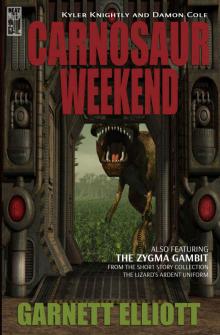 Carnosaur Weekend (Kyler Knightly and Damon Cole Book 1)
Carnosaur Weekend (Kyler Knightly and Damon Cole Book 1) Pale Mars
Pale Mars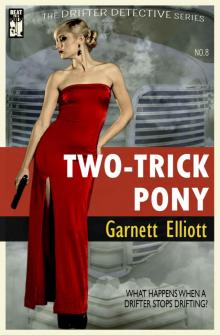 Two-Trick Pony (The Drifter Detective Book 8)
Two-Trick Pony (The Drifter Detective Book 8)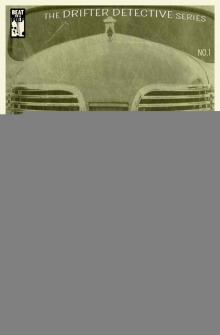 The Drifter Detective
The Drifter Detective The Girls of Bunker Pines (The Drifter Detective Book 3)
The Girls of Bunker Pines (The Drifter Detective Book 3)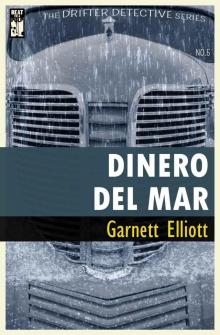 Dinero Del Mar (The Drifter Detective Book 5)
Dinero Del Mar (The Drifter Detective Book 5)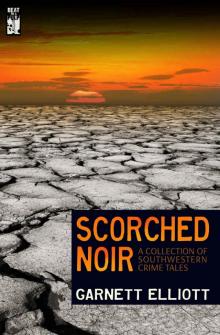 Scorched Noir
Scorched Noir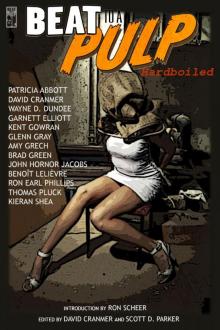 BEAT to a PULP: Hardboiled
BEAT to a PULP: Hardboiled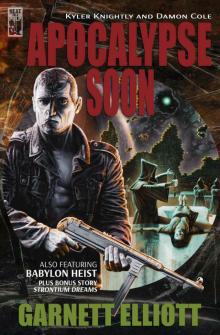 Apocalypse Soon (Kyler Knightly and Damon Cole Book 2)
Apocalypse Soon (Kyler Knightly and Damon Cole Book 2)